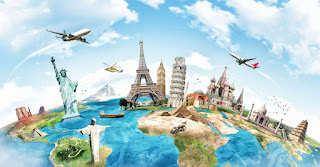by Michael Smith (Veshengro)
The coronavirus (COVID-19) pandemic might spell the end of global travel as we have known it for quite some time now, jetting from one side of the world to the other.
Not only aids such fast travel to other countries far across the globe, and even countries closer, to the spread of any virus, it also can leave, as we have seen, travelers stranded in countries, affected or not from such an event, with almost no way to get back home.
In the more distant past when people traveled abroad, and could afford it, it was done by ships which took many months from one place to another and if a virus or communicable disease became evident then, alas, the yellow flag was hoisted and the entire ship was under quarantine and yes that often meant that people on that ship were going to die in some cases.
The fast world-wide trade, by aircraft and faster ships than in the past also has led to many pests and diseases in plants, animals, and humans to travel from one far flung place to the other at speed. The tree diseases that were inadvertently “imported” to Britain are an example of this.
A reduction of this rushing around the globe for all manner of reasons, many of them non-essential, would do the Planet a great deal of good and also humans in general, as well as people's finances.
It may be nice to see different countries and different cultures close up but this does come at a cost, a cost to the Planet, a cost to the people that are being invaded by tourists (Costa del England is one example) who want the sun but in the same way as if they would be at home without engaging with the local culture and even the local people, in remote areas it also adversely affects the people in other ways, and the cost to our home countries if travelers, inadvertently, bring diseases home.
Most people who annually, or some people more often even, jet off to Spain, Turkey or wherever, to the tourist hot spots, have never even remotely seen all that is to be seen and experienced in the home country.
Time and again one encounters irate tourists coming back from places in Spain, Italy, Greece, Turkey, etc., complaining that they didn't like the food, and especially that the people there didn't speak English and were “too thick to understand what they said or asked for”. This is especially true for British tourists though Americans are not better in that department.
There are those that will make the excuse that it brings money to those people in those foreign countries, e.g. the tourism industry, and gives them jobs. That may indeed be so, but at what costs to the environment and to the people there themselves if they entire economy, or a great part of it, is only geared to tourism? The same excuse that is being made for “organic” green beans being grown in Kenya and flown to Europe and cold cheaper during the season than local produce; a crop that is not part of the local diet and only grown as a “cash crop”. It gives the farmers an income, we are told. So, instead of growing food that they will eat the farmers are growing crops, and even flowers such as roses, for the European market, crops that require a great deal of irrigation in a country (or countries) often lacking enough water in general, are forced to sell this crop at a pittance and then are dependent on buying in food from traders who, again, cut the farmers' throats with high prices.
This pandemic should – but will it? – make us reconsider how we go about doing things and maybe, just maybe, take a different approach.
© 2020
























